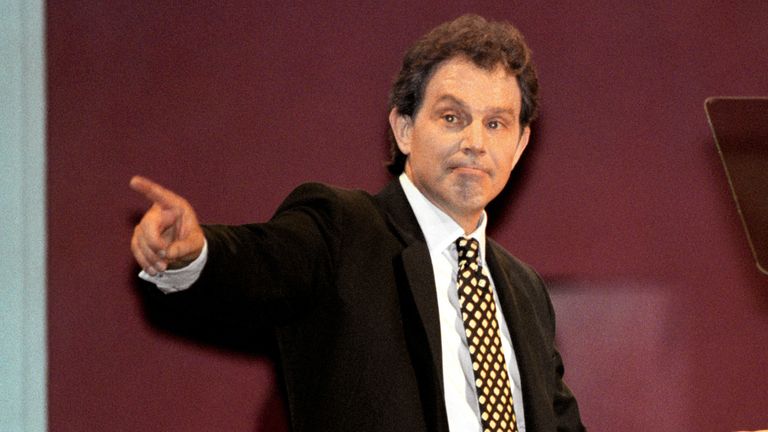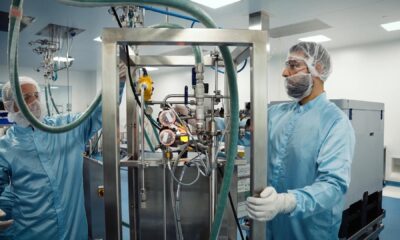Breaking News
Starmer to announce plan to save British high streets – including giving power to block vape shops
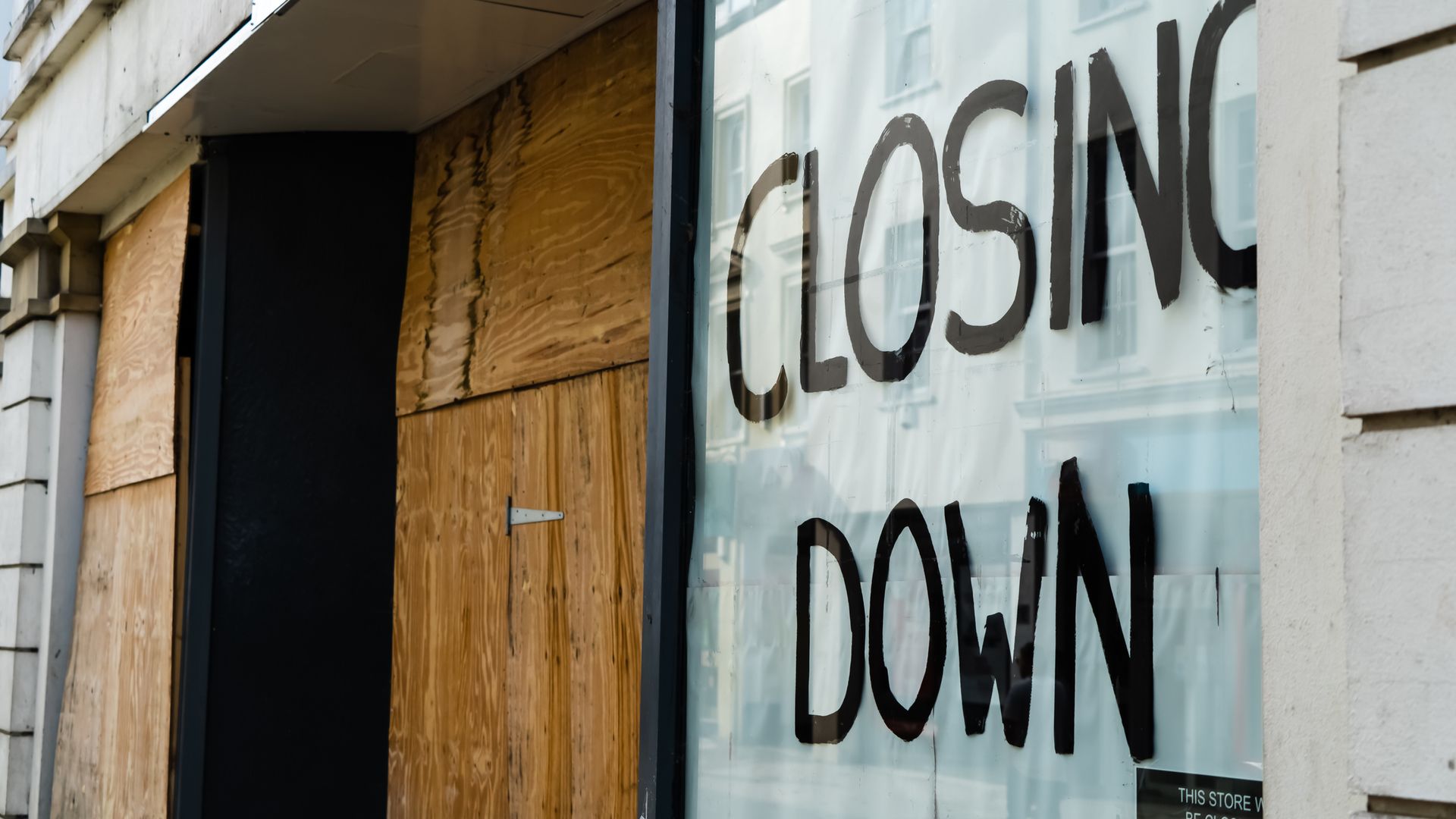
Read more on post .
Sir Keir Starmer is to announce a “Pride in Place” programme with funding for over 330 disadvantaged communities as part of a fightback against Reform UK.
The money will come alongside new powers for local groups to seize boarded-up shops, save derelict pubs and block gambling and vape stores on high streets, the government said.
Politics Live: Cabinet minister claims to have been victim of ‘sexist briefings’
The plan aims to address the sense of isolation in deprived communities, which Labour insiders believe is feeding the rise of Reform UK.
A Labour source described the programme as “absolutely essential” and “transformative”.
They told Sky News: “Reform is trying to divide communities, Labour wants to empower them, and we are giving them the tools and resources to turn them around.”
The full list of places that will receive the cash boost, and how much they will get, will be confirmed by the prime minister on Thursday.
The money is part of the communities funding plan announced by Chancellor Rachel Reeves in her June spending review, which promised new investment for 350 deprived areas across the UK “to improve parks, youth facilities, swimming pools and libraries”.
The government said at the time these areas included the 75 places previously named in the Plan for Neighbourhoods, each of which will get £20m of funding over the next 10 years.
The Spending Review named another 20 “pilot neighbourhoods” in England to receive the same amount of funding, mainly in the north or the Midlands, as well as five other pilots across the rest of the UK.
Sir Keir is expected to announce the rest on Thursday.
Speaking ahead of that announcement, the new housing secretary, Steve Reed, said the money will allow local people to “decide how best to restore pride in their neighbourhoods, not us in Westminster”.
He added: “That’s what real patriotism looks like: building up our communities and choosing renewal over division.”
How will the funding work?
The funding will be allocated to neighbourhood boards made up of community leaders and stakeholders, who will work closely with local councils, it is understood.
They will be granted Community Right to Buy and Compulsory Purchase Powers, allowing them to buy assets like grassroots football clubs, seize derelict buildings and save local pubs, the government said.
Councils will also be given powers to block betting shops, vape stores and fake barbers.
The programme draws similarities with Tony Blair’s New Deal for Communities (NDC), a 10-year regeneration drive that targeted 39 of the most deprived neighbourhoods in England from 2001.
An independent evaluation found NDC partnerships delivered improvements across several indicators, including crime, education and health. The biggest change was how people felt about their neighbourhoods as places to live.
Each area had around £50m of investment under the former Labour prime minister’s programme, but these were geographically bigger than the ones the government is now targeting, it is understood.
The “Pride in Place” Programme has been informed by the work of the Independent Commission on Neighbourhoods (ICON), launched in September last year to review the state of England’s neighbourhoods.
ICON identified 613 “mission critical” neighbourhoods – those they said needed the most urgent attention to make progress on Sir Keir’s “missions” for government.
Read More;
Rivals could take lessons from how Farage ‘hogs the headlines’
The bulk of these were in post-industrial areas in northern England, though high need was also identified in the West Midlands and coastal towns such as Blackpool and Clacton – the latter being the seat of Reform UK leader Nigel Farage.
Many of the sites to be announced are expected to contain a mission-critical neighbourhood within them.
Baroness Hilary Armstrong, a former Labour minister and chair of ICON, said: “If residents start to see positive, tangible changes in their neighbourhoods, this should start to restore the public’s faith in the power of government to do good.”
It comes at a critical time for Sir Keir, who has faced questions over whether he can survive after spending most of his first year in office languishing behind Reform UK in the polls.
Labour MPs have been lobbying for the funding for some time, expressing concern that Number 10’s mission to grow the economy with big infrastructure investments will not directly benefit people in areas that look and feel “left behind”.
Luke Akehurst, the Labour MP for North Durham, told Sky News: “This is what Labour governments are all about – properly funding the areas of the county that most need help.”
Breaking News
It’s got Peaky Blinders swagger, says House of Guinness writer

Read more on post.
Yasmin RufoBBC News
 Netflix
NetflixTaking family power struggles and turning them into global television sensations is becoming something of a habit for screenwriter Steven Knight.
With Peaky Blinders, he took a Birmingham street gang and made them a cultural force. Now, Knight is betting on another dynasty, one rooted in brewing, wealth and legacy.
House of Guinness, which launches on Netflix on Thursday, tells the story of Ireland’s most famous family name at the moment of crisis – Sir Benjamin Guinness has died and his four children, each concealing dark secrets, are left to steer the brewery’s fate.
Knight says when he looked into the real-life Guinness family, “it was immediate that I realised this is an incredible drama and story”.
He was struck by “the characters, events and how it all intermeshed with history and what was going on at the time”.
While the story is based on real events, it is a drama first and foremost. Fact and fiction have been blended together, but Knight says he doesn’t see those two things as mutually exclusive, as “it’s often the true events that are the least believable”.
“Some of the historical events are so amazing and unexpected you wouldn’t make them up yourself,” he tells the BBC.
One of the imagined figures in the Netflix drama is Sean Rafferty, the brewery’s foreman, played by Happy Valley star James Norton, whose fate becomes entangled with the dynasty’s power struggles.
Norton says his character is an “amalgamation of lots of different people” who existed at the time, adding that he found researching into the history of Guinness “remarkable and fascinating”.
The 40-year-old explains that as soon as he read the script he was ready to sign up to the show.
“I read the first four scripts all at once and it was a no-brainer,” he says. “Almost every scene starts with Rafferty’s silhouette in a window in a cloud of smoke and I thought ‘sign me up, that’s really cool’.”
Most of the actors in the series were Irish, something Norton says added a level of pressure when it came to perfecting the accent and admits he was “so scared on the first day”.
 Getty Images
Getty Images“You work really hard at the beginning and once you crack the first big dialogue scene and have spoken the first lines there’s no going back,” he explains.
The first scene Norton filmed was one where he punches three disloyal workers at the Guinness factory. He says he used the line ‘I see your three names written in black ash up there’ to get back into the accent for subsequent scenes.
‘Once in a lifetime experience’
Starring alongside Norton is Irish actress Danielle Galligan who plays Lady Olivia, an aristocrat who marries into the Guinness family. After the British monarch, she was the richest woman in Britain and Ireland at the time.
The actress says she loved researching her character and understanding what she was really like.
“She’s such a firecracker in the series and then I actually found out she was also a very solitary and silent woman who painted lots of watercolours,” Galligan explains.
“She was a woman who had everything and yet was still looking for something. Learning about her gave me a sense of her lack of fulfilment and added another layer to her.”
Galligan says it was very special to tell an Irish story and “to do it on a global scale is a once-in-a-lifetime kind of experience”.
Joining Galligan is Niamh McCormack, whose character is part of the rebellious Fenian Brotherhood, and Jack Gleeson, who is best known for playing Joffrey Baratheon in Game of Thrones.
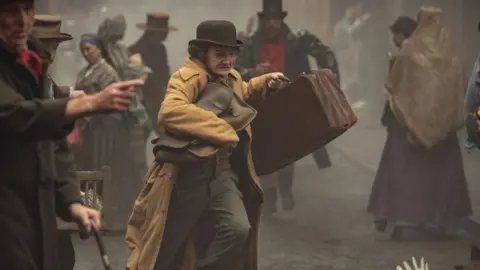 Netflix
NetflixMcCormack and Gleeson say they are proud to be part of a series that puts Ireland on the map, but admit that with pride comes pressure over how it will be received by audiences at home.
“It’s always a factor but I tried not to think about it too much,” Gleeson says. “You want things to be represented well but also hopefully people know not to take it too seriously as a historical document.”
Knight was less worried about what audiences would think, admitting: “I should care but I don’t – if you worry what people are going to think you can’t really do anything as you’d be trying to please too many different people.”
House of Guinness has already been compared to the likes of Succession, The Crown and Peaky Blinders but Knight is indifferent about how people compare it.
“People say every project is a cross between stuff and I don’t take that too seriously, I’m confident that this is its own thing,” he says.
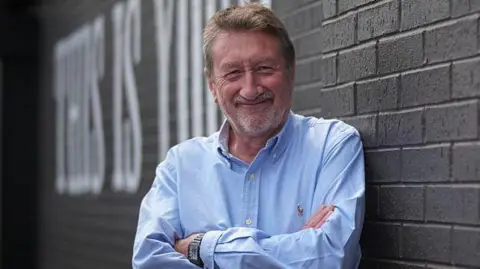 Getty Images
Getty ImagesFor Norton, who is also currently starring in BBC’s historical drama King & Conqueror, to be compared to such successful shows is a positive.
“To be in the same breath as those dynasty shows is great and I’m happy if we’re included among that group,” he says. Gleeson agrees and explains that this drama “takes the best bits of the rest and adds its own magic and essence”.
Knight does admit that there are many similarities between House of Guinness and Peaky Blinders and the shows have influenced each other as the 66-year-old has recently finished working on the Peaky Blinder film, The Immortal Man, which will see Cillian Murphy reprise his role as Birmingham gangster Tommy Shelby.
“Sometimes parallels are pointed out that I don’t even have a clue about,” he laughs. “But there are a lot of similarities – the family, it has the same energy, humour and swagger.”
 BBC Studios
BBC StudiosKnight is also involved in writing the new James Bond film, which he previously told the BBC had always been on his bucket list.
The movie will be directed by Dune’s Denis Villeneuve and is currently in development and being overseen by Amazon MGM Studios after long-serving masterminds Barbara Broccoli and Michael G Wilson stood down in February.
When asked a question about Bond, Knight smiles and says he’s not able to talk about it but does admit that after the success of several of his shows, he feels a greater freedom to write more creatively.
And with House of Guinness, he hopes to have used that freedom to make this latest dynasty saga a success in its own right.
Breaking News
UK boosts pandemic readiness with new vaccine factory
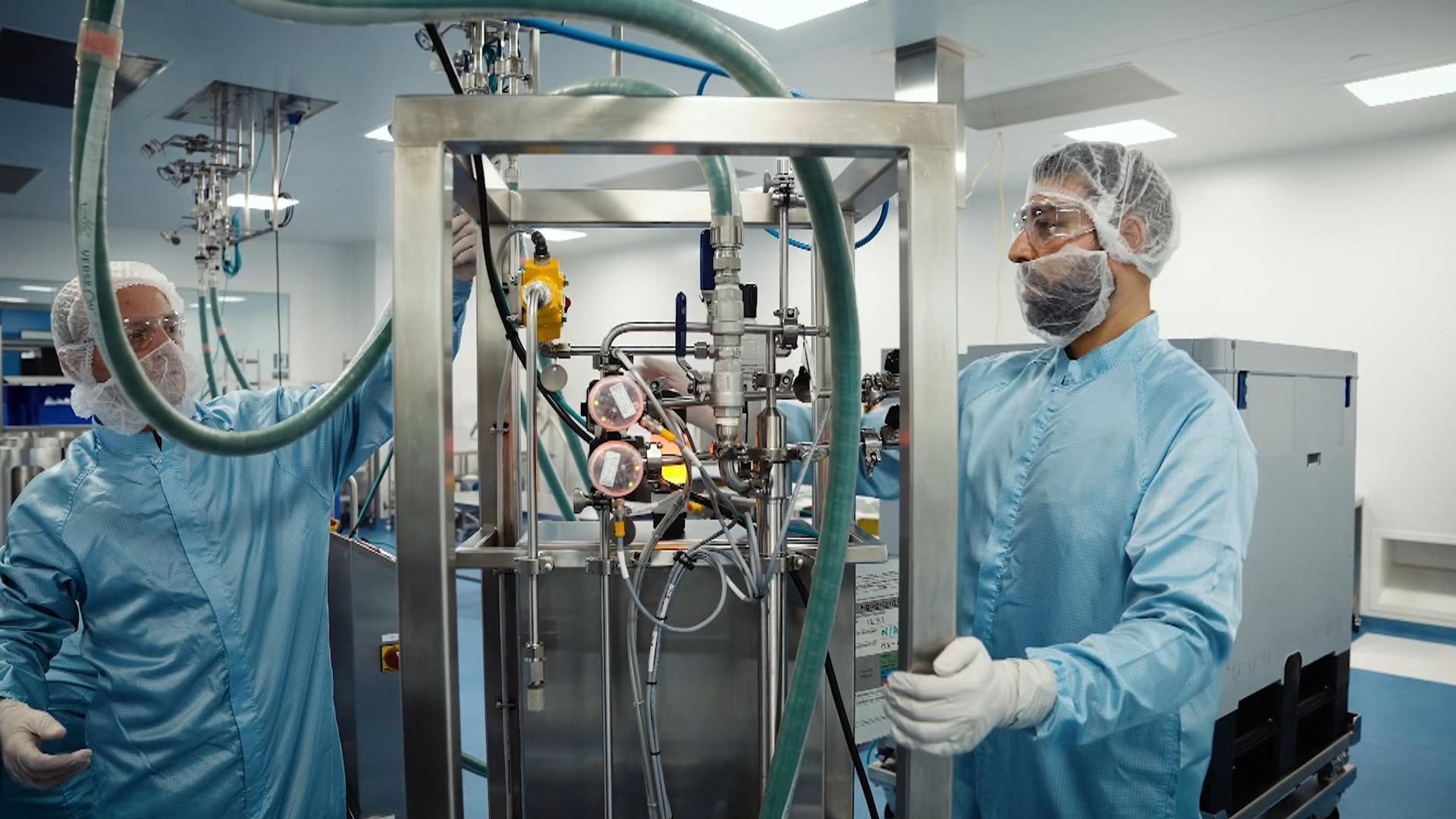
Read more on post .
A US vaccine firm has opened the first mRNA manufacturing plant in the UK, against a backdrop of increasing anti-jab rhetoric back home.
The new facility outside Oxford is part of a £1bn investment in the UK by Moderna, which specialises in mRNA.
The novel vaccine technology delivered some of the most effective and fastest-to-develop jabs during the COVID pandemic.
Several pharma companies, including Germany’s leading mRNA pioneer BioNTech, are now racing to develop new therapies.
Moderna says the plant will produce up to 100 million doses of its existing vaccine products each year. It has also been designed to scale-up production to 250 million doses a year in the event of a new disease outbreak.
“God-forbid, if there is another pandemic, we can switch the facility any day,” said Moderna CEO Stephane Bancel.
The UK investment deal was agreed by the previous government, but the plant’s opening is welcome relief for the current one.
In recent weeks, four major pharmaceutical companies have halted planned investments in the UK following disputes over drug pricing and profitability in the UK.
‘A great statement’
It also promises to restore domestic vaccine manufacturing capability in the UK, the lack of which was exposed when dangerous supply interruptions threatened the early COVID response.
“It’s a really fast way of getting new vaccines discovered,” said Lord Patrick Vallance, former chief scientist and now science minister.
“It’s also a great statement of confidence in the UK that [Moderna has] chosen to base themselves here.”
The Trump effect
The mRNA molecule is the same used by our cells to order the production of new proteins, and allows vaccines to be produced using just the genetic code of a virus or other biological target.
Moderna’s investment decision pre-dated Donald Trump’s return to the White House, but the Moderna CEO said its operation in the UK – a country that “still believes in vaccination” – may pay dividends if anti-vaccine rhetoric translates into a lack of demand for its products in the US.
“If there is less appetite by governments around the world, including in the US, to use vaccines, we might invest less in vaccines,” said Mr Bancel.
“We have to invest where there’s a demand for our products.”
Read more: All health claims made by Trump – and what experts say
The UK presents other attractions for the company which has suffered substantial losses as demand for its COVID vaccine has fallen.
It’s betting that leading UK universities and a large patient population will make for successful clinical trials.
The company has ongoing NHS trials of new jabs against seasonal flu, a combination COVID and flu vaccine, cancer vaccines and mRNA therapies for two inherited childhood diseases.
Moderna says it is now the largest private commercial sponsor of clinical trials in the UK.
Breaking News
‘Pathetic’ fines won’t stop water pollution, say campaigners
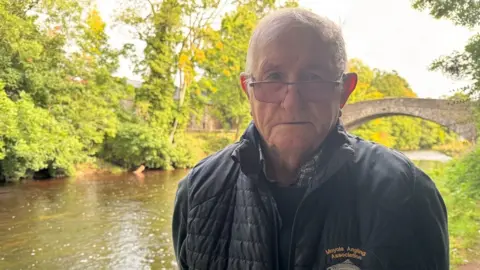
Read more on post.
Luke SprouleBBC News NI Mid Ulster reporter
Campaigners have said stronger deterrents are needed to stop water pollution after figures obtained by BBC News NI showed there were 63 fines handed down between 2020 and 2024.
In the same period there were 4,202 water pollution incidents confirmed by the Northern Ireland Environment Agency (NIEA).
The Department for Agriculture, Environment and Rural Affairs (Daera) is consulting on whether fixed penalty notices should be introduced, which would mean polluters could be fined without the lengthy process of prosecuting them through the courts.
Friends of the Earth said unless there was a more effective deterrent there would be “more and more of these shocking crimes against water”.
In recent years large blooms of potentially toxic blue-green algae in Lough Neagh – caused in large part by long-term pollution – have grabbed the headlines.
But incidents of pollution happen right across Northern Ireland’s waterways, not just those which eventually lead to the lough.
Daera said it and the NIEA took the issue very seriously and that the NIEA investigated all reports it received and pursued offenders.
Call to scrap limit on fines
James Orr from Friends of the Earth said the figures revealed “an epidemic in relation to how we’re treating our rivers, lakes and sea loughs”.
He said fixed penalty notices – which are already used for things such as dog fouling or illegal parking – had pros and cons.
“We can’t have these cases dragged through the courts for years and years and then a pathetic fine introduced at the end.
“On the one hand we would be quite encouraged that we could simplify these processes.
“On the other hand, we need the penalty to reflect the seriousness of the crime.
“This is not like parking on a double yellow line, this is much more serious.”
Under the current rules, the maximum fine that can be handed down is £20,000.
Mr Orr called for this limit to be scrapped and said there should be an independent Environmental Protection Agency.
The Daera consultation on whether to introduce fixed penalty notices is also asking people whether or not the maximum fines should be increased to £50,000 in magistrates’ courts and whether the limit should be removed entirely in Crown courts.
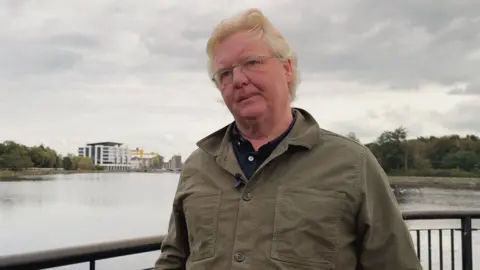
All 63 fines ranged from £200 to £10,000.
Of these, six were more than £5,000.
In a statement, Daera said formal enforcement action was normally considered for water pollution incidents which it deemed to have a “high” or “medium” severity.
Lower severity incidents normally did not lead to formal enforcement action and would see NIEA work with the polluter to identify the cause and stop it happening again.
From 2020 to 2024, 96 incidents were deemed to be high severity and 542 medium, with the rest categorised as low.
People who use the waterways have said they are frustrated that incidents of pollution keep happening.
In June, anglers on the Moyola River raised the alarm after the river was turned brown due to what they believe was discharge from industry.
Maurice Dorrity, who has been fishing on the river for decades, said the situation was getting worse.
“I had a meeting on the bank of the river 30 years ago [to discuss] the same problem and it’s not got any better, it’s still the same,” he said.
“It has a devastating effect on the fish life.
“On the bed of the river the fish depends on the invertebrates, small insects to sustain their life, just like we need the ground to grow our crops.
“It clogs up all that invertebrate life on the bed of the river and it means the fish are not getting the food they require.”

Social Democratic and Labour Party (SDLP) councillor Denies Johnston reported the incident to the NIEA.
She said many of the problems were stemming from some “irresponsible” farmers and industries.
“There must be a two-prong response, we must incentivise good practice and punish infringements,” she said.
“Until we clamp down on those who are disregarding the advice, ignoring regulations and putting their own selfish interests ahead of our environment, our waters will continue to run orange (as was the case in the Moyola in July) and green (as in Lough Neagh).”
A Daera spokesperson said in addition to fines, other methods including warning letters and notices were available to it.
They added that strengthening environmental governance was a top priority for Daera Minister Andrew Muir.
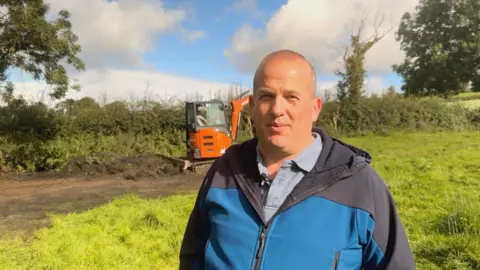
Incidents do not have to be large in scale to cause damage.
Earlier in September, an incident south of Dungannon led to sewage spewing into the River Rhone.
The NIEA said it was caused by wipes and rags being disposed of incorrectly.
Democratic Unionist Party councillor Clement Cuthbertson said it was a reminder that it was not just agriculture to blame for pollution.
“The landowner had livestock in the field and they had to be moved back to allow a clean up to take place,” he said.
“There needs to be investment on the network.
“Our towns and our villages are expanding all the time, but to be fair to NI Water they are still working on the original pipeworks that could be 40 or 50 years old.”
-
Culture2 days ago
Taylor Swift’s new cinema outing generates more than €12million in just 24 hours
-
Politics2 days ago
European Parliament snubs Orbán with vote to shield Italian MEP from Hungarian arrest
-
Culture1 day ago
Milan Fashion Week 2025: Unmissable shows and Giorgio Armani in mind
-
Culture2 days ago
Marvel stars Mark Ruffalo and Pedro Pascal stand up for Jimmy Kimmel as Disney boycott intensifies
-
Opinion2 days ago
AI Is Pointless If It Doesn’t Boost Productivity
-
Business14 hours ago
Households to be offered energy bill changes, but unlikely to lead to savings
-
Culture2 days ago
From Koniaków to Paris: how traditional Polish crocheting is captivating high fashion
-
Culture1 day ago
Traitors Ireland finale: A tense and thrilling conclusion to a spectacular first season


